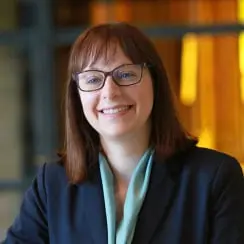 | 1.5 LU / HSW |
 | 1.5 LU / HSW |
Call to Action:
Abstract: While gender-inclusivity has been the clarion call for reimagining what restrooms look like in schools, designers have long understood that thoughtful design focused on inclusivity benefits all students. Beginning in 2016, Saint Paul Public Schools, the largest urban school district in the state of Minnesota, has been converting schools wholesale to a new, inclusive restroom design. With 15 of the district’s 68 schools now fully converted, large-scale analysis of the impact of the inclusive restrooms yields quantifiable benefits to students’ behavior and perceptions of safety. This session will dive into new research from the district’s family and student surveys, student discipline records, and maintenance work orders to depict the benefit inclusive restrooms are having, and share why Saint Paul Public Schools strongly advocates for a particular design standard for inclusive restrooms to realize those benefits. This session will also contextualize the funding and building code compliance components of making these restrooms a reality.
Learning Objectives:

Tom is the Executive Director of Operations and Administration for Saint Paul Public Schools, the largest urban school district in the state of Minnesota, where his primary responsibility is supporting the 9 departments and thousands of people who make the school district run, both on a day-to-day and strategic level. One area of particular focus for Tom has been on the role that communities can play in the strategic planning of the built environment, which has garnered recognition from the International Association of Public Participation. He is a licensed architect with a background in working with education and non-profit organizations, and was a 2013 Hubert H. Humphrey Policy Fellow at the University of Minnesota.

Michelle is a Project Manager with St Paul Public Schools working to provide students and teachers with high-quality, responsive learning environments through major capital improvement projects as well as a variety of deferred maintenance projects. Michelle has a degree in Architecture with a minor in Construction Management from the University of Minnesota

Heidi brings a combination of commitment, drive, and sensitivity to each project. She is adept at leading immersive workshops, engaging with clients and user groups, to transform their vision and needs into active environments for learning. Heidi is leading conversations across the country based on her research of the key design components that contribute to safety and security of inclusive restroom design. Heidi is the 2018 recipient of the AIA Minnesota Young Architect Award.
Design of Educational Facilities
Acts as a resource to the design team in providing ongoing guidance and support to ensure that the emerging and ultimate design aligns with the established community vision, education goals, future programming, written design standards, best/next practices and education policy.